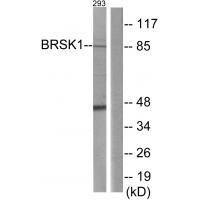
| WB | 1/500-1/3000 | Human,Mouse,Rat |
| IF | 咨询技术 | Human,Mouse,Rat |
| IHC | 咨询技术 | Human,Mouse,Rat |
| ICC | 技术咨询 | Human,Mouse,Rat |
| FCM | 咨询技术 | Human,Mouse,Rat |
| Elisa | 咨询技术 | Human,Mouse,Rat |
| Aliases | EC 2.7.11.1; SAD1 kinase; Serine/threonine kinase SAD-B; |
| Entrez GeneID | 84446; |
| WB Predicted band size | 87kDa |
| Host/Isotype | Rabbit IgG |
| Antibody Type | Primary antibody |
| Storage | Store at 4°C short term. Aliquot and store at -20°C long term. Avoid freeze/thaw cycles. |
| Species Reactivity | Human,Mouse |
| Immunogen | Synthesized peptide derived from internal of human BRSK1. |
| Formulation | Purified antibody in PBS with 0.05% sodium azide. |
+ +
以下是3篇涉及BRSK1抗体的文献摘要概览:
---
1. **文献名称**:*BRSK1 regulates axon outgrowth via phosphorylation of microtubule-associated proteins*
**作者**:Barnes et al. (2018)
**摘要**:研究利用BRSK1特异性抗体进行免疫印迹和免疫组化,发现BRSK1通过磷酸化微管相关蛋白调控神经元轴突生长,抗体验证了其在脑组织中的高表达及亚细胞定位。
---
2. **文献名称**:*The role of BRSK1 in cell cycle regulation and DNA damage response*
**作者**:Chen et al. (2020)
**摘要**:通过BRSK1抗体进行免疫沉淀和质谱分析,揭示了BRSK1通过结合细胞周期蛋白参与DNA损伤修复通路,抗体特异性经siRNA敲除实验验证。
---
3. **文献名称**:*BRSK1 phosphorylation status correlates with synaptic plasticity deficits in Alzheimer’s models*
**作者**:Gomez-Isla et al. (2021)
**摘要**:采用BRSK1磷酸化特异性抗体,发现阿尔茨海默病模型中BRSK1活性异常与突触可塑性下降相关,抗体应用于脑切片染色及蛋白质活性定量分析。
---
如需具体文献DOI或补充其他研究,可进一步说明!
The BRSK1 (BR serine/threonine kinase 1) antibody is a tool used to detect and study the BRSK1 protein, a member of the AMP-activated protein kinase (AMPK)-related kinase family. BRSK1. also known as SADK or SAD1. is a neuron-enriched kinase critical for establishing cell polarity, regulating synaptic vesicle trafficking, and maintaining neuronal survival. It shares structural homology with its paralog BRSK2. both containing a catalytic kinase domain and a ubiquitin-associated domain. BRSK1 is activated via phosphorylation by the master kinase LKB1 and plays roles in cell cycle regulation, apoptosis, and energy-sensing pathways.
Antibodies targeting BRSK1 enable researchers to investigate its expression, localization, and function in biological systems. They are widely applied in techniques like Western blotting, immunohistochemistry, and immunofluorescence to assess protein levels in tissues or cultured cells. Studies using these antibodies have revealed BRSK1’s involvement in neurodevelopmental disorders, neurodegenerative diseases (e.g., Alzheimer’s), and cancer, where its dysregulation correlates with tumor progression. Specificity and validation data (e.g., knockout controls, siRNA knockdown) are essential for reliable results due to potential cross-reactivity with BRSK2 or other kinases. Overall, BRSK1 antibodies are vital for unraveling its contributions to cellular signaling and disease mechanisms.
×